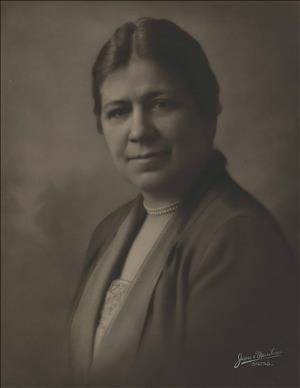Bertha Knight Landes, elected mayor of Seattle in 1926, became the first woman to lead a major American city. She ran on a platform of "municipal housekeeping," vowing to clean up city government. She advocated municipal ownership of utilities such as City Light and street railways. Her single term ended in 1928, but she remained a civic leader and role model for women.
Active Mother of Three
Bertha Knight was born in Ware, Massachusetts, on October 19, 1868. She met her future husband, Henry Landes (d. 1936), during their student years at the University of Indiana. In 1895, they moved to Seattle, where he worked as professor of geology and later Dean of the College of Sciences at the University of Washington. A devoted wife and mother of three children, she saw the community as an extension of the home. She played leadership roles in several women's organizations, including the Women's University Club, the Woman's Century Club, the League of Women Voters, and the Women's Auxiliary of University Congregational Church.
In 1921, as president of the Seattle Federation of Women's Clubs, Landes orchestrated a weeklong Women's Educational Exhibit for Washington Manufacturers. Staffed by more than 1,000 clubwomen, it bolstered the spirits of the business community during a period of severe recession. The president of the Chamber of Commerce praised her for her leadership, and the mayor subsequently appointed her as the lone woman on a five-member commission to study unemployment in the city. When she made her decision to run for city council in 1922, her husband said, "It's simply the natural enlargement of her sphere. Keeping house and raising a family are woman's logical tasks, and in principle, there's no difference between running one home and a hundred thousand." According to historian Doris Pieroth, "Both Landeses saw her career as duty and service rather than an opportunity for fulfillment of her own ambition, and they both justified her political activities within the context of woman's proper place" (Pieroth, 89).
Spring Cleaning
On March 9, 1926, running on a platform that stressed "municipal housekeeping," the 58-year-old Landes defeated Edwin J. ("Doc") Brown by a margin of 6,000 votes to become the first woman mayor of any major American city. She set to work, calling on good citizens to blow the whistle on bootleggers and offered $1 a year to those who pledged to report reckless drivers. She instructed the police force to see that regulations for dance halls and cabarets were enforced.
Landes turned the tide of widespread corruption in city government with an honest, scandal-free administration. She appointed qualified professionals to head city departments, improve public transportation and parks, and put the city's financial house in order. One of her administration's legacies is the Civic Auditorium (renovated as the Seattle Opera House for the 1962 World's Fair), for which she broke ground.
Voters Succumb to "Sex Prejudice"
In her bid for re-election, Landes received endorsements from all of Seattle's major newspapers, the Central Labor Council, the Prohibition Party, and women's organizations. Despite her high ratings, she lost the March 13, 1928, election to Frank Edwards, a political unknown. She attributed her defeat primarily to her opponent's lavish campaign budget and to "sex prejudice." There was a popular sentiment that a city of stature should have a man at the helm. Ironically, in 1931 angry voters recalled Mayor Edwards. A tool of private utilities interests, he short-circuited his own career when he fired the popular J. D. Ross from City Light.
Landes went on to take other leadership positions. She was the first woman to serve as moderator of Washington's Conference of Congregational and Christian Churches. In 1925, she became a charter member of the Seattle Soroptimists, a professional women's organization, and was elected national president in the 1930s. She wrote extensively for national magazines, encouraging other women to get involved in politics, which, she maintained, was their natural sphere.
From 1933 to 1936, Henry and Bertha Landes led University of Washington-sponsored student study groups to the Far East. Following his death in 1936, she agreed to lead the tour alone for another summer. In failing health, she curbed her public activities, but continued to live independently at the Wilsonian Hotel in Seattle's University District until 1941, when she moved to Pacific Palisades, California. She died at her son's home in Ann Arbor, Michigan, on November 29, 1943, at the age of 75.

